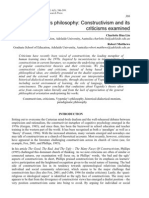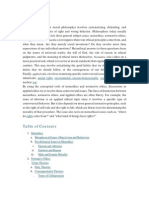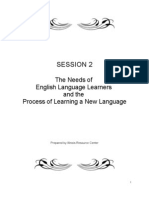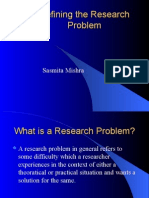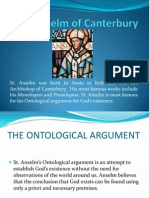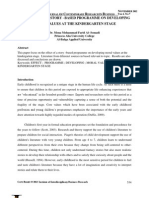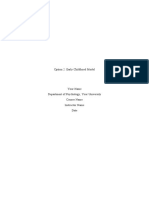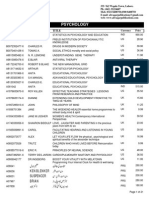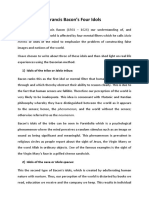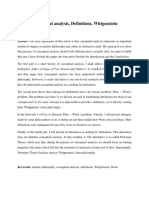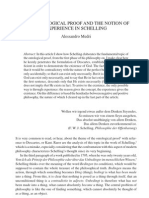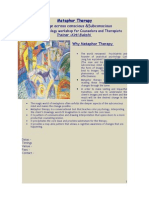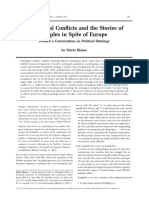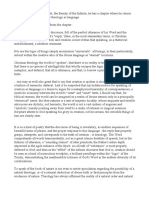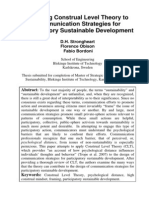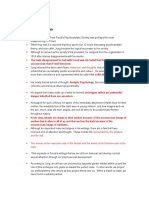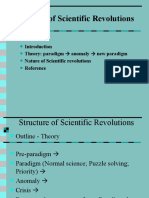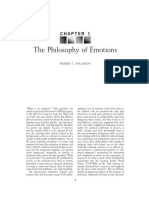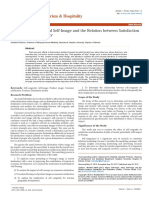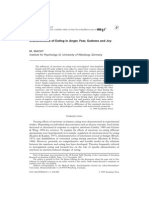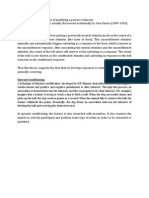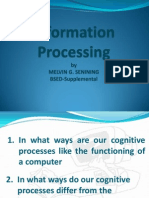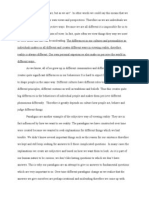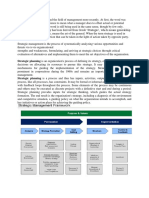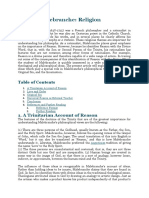The Ontological Argument
The Ontological Argument
Uploaded by
Hannah Mohy-EldinCopyright:
Available Formats
The Ontological Argument
The Ontological Argument
Uploaded by
Hannah Mohy-EldinCopyright
Available Formats
Share this document
Did you find this document useful?
Is this content inappropriate?
Copyright:
Available Formats
The Ontological Argument
The Ontological Argument
Uploaded by
Hannah Mohy-EldinCopyright:
Available Formats
Yamina Hamadache
The Ontological Argument was devised by St. Anselm in his Proslogion 2-4. It is an a priori argument. It is deductive as it draws its argument purely from a set of premises. It makes no claims to truth, only logic. The Ontological Argument works from these premises: 1. God is that than which no greater can be conceived. 2. Both believers and non-believers accept this, even the fool from Psalm 14. 3. It is possible to exist either just in the mind, or in both the mind and reality. 4. It is better to exist in both the mind and in reality. That than which no greater can be conceived must exist in the mind AND in reality, being the best of all things i.e. God exists.
He then goes on to say that... That which we cannot conceive as not existing must be greater than what we can conceive of not existing. It would be absurd to say that that which no greater can be conceived does not exist, because that would mean a greater entity would exist in reality (because, according to Anselm, that which exists in reality is greater than that which exists only in the mind)
Malcolm resurrected the Ontological argument in the 1960s. His version went like so: 1. If God came into existence now, he would not be God. 2. If God does not existence now his existence is impossible (as he is eternal). 3. Therefore Gods existence is either necessary or impossible. 4. His existence would be impossible if it were contradictory or illogical. 5. It is not, so Gods existence is necessary. 6. In the same way, God is necessarily omniscient and omnipotent.
According
to Malcolm his argument would only be accepted by believers. He viewed it as Euclids deduction of prime numbers; once you understand prime numbers, you must accept Euclids deduction. In the same way, only believers who have grasped necessary existence will accept his argument. The problem with this is, it makes the argument seem fruitless; why prove something to those who are already convinced? Also, Anselms idea of the Ontological Argument involved even the fool accepting his idea of God.
A monk named Gaunilo replied on behalf of the fool, saying I can conceive of a most real and perfect island. It is better to exist in mind and reality. Therefore this island must exist. The idea of a perfect island is absurd, as is Anselms argument. ANSELM REPLIED: An island is contingent; as with all contingent things it can be conceived as not existing. Anselm claimed that that than which no greater can be conceived cannot not exist and the two are not comparable. He concluded that Gods existence is necessary. Also, an island has no intrinsic maximum. It can always be bettered; trees can be added etc., whereas God cannot be bettered.
AQUINAS rejected the argument, on the grounds that there is no universally accepted definition of God. DESCARTES, however, agreed with Anselm. His argument was this: I can conceive of a perfect being that has all the perfections. I must name these perfections. Necessary existence is a perfection. Any being which has ever not-existed cannot be perfect. Therefore such a perfect being (God) must exist. Descartes argued that existence was Gods essence and could no more be separated from him than three points can be separated from a triangle.
KANT
disagreed with Descartes existence is not a predicate, he said. You can describe a black horse, but to say a black horse EXISTS adds nothing to the idea of the black horse. He also said that, seeing as we do not know God exists, the statement must be synthetic and not analytical. Therefore existence must be attached to God and not intrinsic to him.
You might also like
- LIS 768 - Participatory Services and Emerging Technologies - Social Reading Research PaperDocument22 pagesLIS 768 - Participatory Services and Emerging Technologies - Social Reading Research PaperAllison Mary Mennella100% (1)
- Liu Matthews 2005Document14 pagesLiu Matthews 2005Jom JeanNo ratings yet
- Ethics by James FieserDocument17 pagesEthics by James FiesermaulshiroNo ratings yet
- 2-Needs of EL and Developing New LanguageDocument18 pages2-Needs of EL and Developing New LanguageRildo ReisNo ratings yet
- Rapunzel The Real StoryDocument5 pagesRapunzel The Real StoryDroopyfever0% (1)
- Seven Deadly Sins As Per Mahatma GandhiDocument6 pagesSeven Deadly Sins As Per Mahatma GandhiJAMESJANUSGENIUS5678No ratings yet
- Phoebe & Laurence Bendit - Intro To Analytical PsychologyDocument11 pagesPhoebe & Laurence Bendit - Intro To Analytical PsychologyTom RueNo ratings yet
- How To Write A Journal Article Review APA StyleDocument3 pagesHow To Write A Journal Article Review APA StyleMaria PiaNo ratings yet
- Dreaming The Role Acting and The Structure of ImaginationDocument15 pagesDreaming The Role Acting and The Structure of ImaginationTyler SmithNo ratings yet
- Defining The Research ProblemDocument7 pagesDefining The Research ProblemDurga Prasad Dash82% (11)
- Ontological ArgumentDocument11 pagesOntological Argumentlaurel_jaimeNo ratings yet
- The Effect of A Story - Based Programme On Developing Moral Values at The Kindergarten StageDocument26 pagesThe Effect of A Story - Based Programme On Developing Moral Values at The Kindergarten StagemariangoudNo ratings yet
- C10 Personality StudyguideDocument9 pagesC10 Personality StudyguidePreetam DonepudiNo ratings yet
- Resisting Influence - Philip Zimbardo & Cindy X. WangDocument21 pagesResisting Influence - Philip Zimbardo & Cindy X. WangWilliam J. Moreno0% (1)
- Bank Street ApproachDocument5 pagesBank Street ApproachTime Save100% (1)
- Psychology Books by Al Waqar PUBDocument21 pagesPsychology Books by Al Waqar PUBkamikrrbNo ratings yet
- Knowing OneselfDocument15 pagesKnowing OneselfArcadian Eunoia100% (1)
- Reasons To Believe That The Ideas AccuratelyDocument6 pagesReasons To Believe That The Ideas Accuratelythomasfinley44No ratings yet
- Idealism Theory: Basic Metaphysics of IdealismDocument3 pagesIdealism Theory: Basic Metaphysics of IdealismAmir Khan0% (1)
- Moral Development TheoryDocument2 pagesMoral Development TheoryMikaelaMaeVillaluzNo ratings yet
- 01 - Part 1 - Approaching The Unconscious PDFDocument48 pages01 - Part 1 - Approaching The Unconscious PDFlivnhaNo ratings yet
- Using Francis Bacons Idols To Foster Cri PDFDocument3 pagesUsing Francis Bacons Idols To Foster Cri PDFCarl SerranoNo ratings yet
- NoneDocument12 pagesNoneJosephine Ondja100% (1)
- Front Matter - How People Learn - Brain, Mind, Experience, and School - Expanded Edition - The National Academies Press Step 6Document9 pagesFront Matter - How People Learn - Brain, Mind, Experience, and School - Expanded Edition - The National Academies Press Step 6nathalialqs0% (1)
- Still Believe in The MBTI Personality Type Theory? Think AgainDocument3 pagesStill Believe in The MBTI Personality Type Theory? Think AgainJennifer WilsonNo ratings yet
- Exposure, Attention and PerceptionDocument55 pagesExposure, Attention and PerceptionFhroilan JayNo ratings yet
- Essence (Essentia)Document7 pagesEssence (Essentia)Paul HorriganNo ratings yet
- Conceptual Analysis, Definitions, WittgensteinDocument10 pagesConceptual Analysis, Definitions, WittgensteinПетар СрдановићNo ratings yet
- Schelling OntologicalDocument14 pagesSchelling Ontologicalarrupe2100% (1)
- Final Brouchure MetaphorsDocument3 pagesFinal Brouchure MetaphorsKirti BakshiNo ratings yet
- Journey Concept StatementsDocument2 pagesJourney Concept StatementsDan SchofieldNo ratings yet
- Ah, I See! Metaphorical Thinking and The Pleasure of Re-CognitionDocument25 pagesAh, I See! Metaphorical Thinking and The Pleasure of Re-CognitionEduardo Souza100% (1)
- StartingDocument2 pagesStartingMuhammad Yusuf PilliangNo ratings yet
- Ontological Conflicts and The Stories of PDFDocument22 pagesOntological Conflicts and The Stories of PDFDanielNo ratings yet
- Mbti PDFDocument24 pagesMbti PDFHisham MohammedNo ratings yet
- In David Bentley HartDocument6 pagesIn David Bentley HarthenriqueNo ratings yet
- The War of Art PDFDocument1 pageThe War of Art PDFethanNo ratings yet
- ABOUT Professional Ontological CoachingDocument3 pagesABOUT Professional Ontological CoachingMónicaNo ratings yet
- Applying Construal Level Theory To Communication For DevelopmentDocument123 pagesApplying Construal Level Theory To Communication For Developmentnonimugo100% (1)
- Carl JungDocument2 pagesCarl JungPrabhath Kodancha GujjadiNo ratings yet
- Introduction To Philosophy of EDUCATIONDocument88 pagesIntroduction To Philosophy of EDUCATIONMark Nel VenusNo ratings yet
- Othello As Tragic HeroDocument5 pagesOthello As Tragic Heroapi-300710390100% (1)
- Value JudgementDocument30 pagesValue JudgementShen WilliamNo ratings yet
- Client Centered Theraphy: Self ConceptDocument6 pagesClient Centered Theraphy: Self ConceptMaria Raquel Elizabeth CastilloNo ratings yet
- Mysticism in Subliminal Advertising: March 2012Document19 pagesMysticism in Subliminal Advertising: March 2012Marlon KNo ratings yet
- IHS-09Thomas Kuhns Structure of Scientific RevolutionsDocument12 pagesIHS-09Thomas Kuhns Structure of Scientific RevolutionsAbhishek SinghalNo ratings yet
- Philosophy of EmotionsDocument14 pagesPhilosophy of EmotionsBÜŞRA COŞKUNNo ratings yet
- How I Run My Virtual Classes-1Document28 pagesHow I Run My Virtual Classes-1JaySeevaNo ratings yet
- Socialogy AssignmentDocument9 pagesSocialogy AssignmentFabihaZehraNaqviNo ratings yet
- Toward A New Approach To The Sutyd of Personality in CultureDocument11 pagesToward A New Approach To The Sutyd of Personality in Culturewyh1919100% (1)
- Confessions of A Passionate Seeker: Bridging the Gap from Ego to EssenceFrom EverandConfessions of A Passionate Seeker: Bridging the Gap from Ego to EssenceNo ratings yet
- Angelina Bennet PDFDocument23 pagesAngelina Bennet PDFsddsppNo ratings yet
- Integral TheoryDocument6 pagesIntegral TheoryDaryl Johnson100% (1)
- The Power of Vision: Transforming Your Vision into RealityFrom EverandThe Power of Vision: Transforming Your Vision into RealityRating: 3 out of 5 stars3/5 (2)
- Language and KnowledgeDocument10 pagesLanguage and KnowledgeMoncif DaoudiNo ratings yet
- Piaget LectureDocument24 pagesPiaget LectureSuraj SriwastavNo ratings yet
- Cognitive Learning PrinciplesDocument40 pagesCognitive Learning PrinciplesalexNo ratings yet
- Actual Self Image Ideal Self Image and The Relation Between Satisfaction and Destination Loyalty 2167 0269.1000102Document11 pagesActual Self Image Ideal Self Image and The Relation Between Satisfaction and Destination Loyalty 2167 0269.1000102Anupama KujurNo ratings yet
- Characteristics of Eating in Anger, Fear, Sadness and JoyDocument11 pagesCharacteristics of Eating in Anger, Fear, Sadness and Joyxiejie22590No ratings yet
- Classical Conditioning and Operant ConditioningDocument1 pageClassical Conditioning and Operant ConditioningSridharsVs0% (1)
- Pbell Lesson PlanDocument6 pagesPbell Lesson Planapi-423888801No ratings yet
- Year 2 Unit 14 Reading 2Document7 pagesYear 2 Unit 14 Reading 2Daniel KohNo ratings yet
- Tugas Matkom (3) - 20082010021Document7 pagesTugas Matkom (3) - 20082010021Haikal Azam AssiddiqiNo ratings yet
- Philo 1Document12 pagesPhilo 1Ariana CerdeniaNo ratings yet
- Research1Document77 pagesResearch1Ces AriaNo ratings yet
- Information ProcessingDocument27 pagesInformation ProcessingBakhaw Elem Alumni IncNo ratings yet
- Second Quarter Examination Practical Research IiDocument2 pagesSecond Quarter Examination Practical Research IiPats Miñao100% (3)
- Leadership and Levels of Analysis: A State-Of-The-Science ReviewDocument41 pagesLeadership and Levels of Analysis: A State-Of-The-Science ReviewGuadalupe JimenezNo ratings yet
- Eugene Seraphim Rose - Nihilism: The Root of The Revolution of The Modern AgeDocument62 pagesEugene Seraphim Rose - Nihilism: The Root of The Revolution of The Modern AgeAnonymous kPDkDlAbv100% (2)
- Digital Games in The Classroom PDFDocument46 pagesDigital Games in The Classroom PDFAnastasiaNo ratings yet
- Lesson 4-The Human Person Flourishing in Terms of Science and TechnologyDocument41 pagesLesson 4-The Human Person Flourishing in Terms of Science and TechnologyJullian Paul GimenaNo ratings yet
- EXAMINING BIASES QuizDocument2 pagesEXAMINING BIASES QuizJade Delos SantosNo ratings yet
- Didactics and The Teaching of English As A Foreign Language Without Study QuestionsDocument7 pagesDidactics and The Teaching of English As A Foreign Language Without Study Questionskawaii100% (1)
- Book Review-Managers Not MBADocument2 pagesBook Review-Managers Not MBAkumudr_9No ratings yet
- Sistemas de MemoriaDocument9 pagesSistemas de MemoriaLorena VergaraNo ratings yet
- TOK EssayDocument3 pagesTOK EssayOlivier SorghoNo ratings yet
- Mind-Body Philosophy LectureDocument281 pagesMind-Body Philosophy Lecturenihilius79100% (1)
- MACINTYRE, Alasdair. Virtues in Foot and Geach PDFDocument12 pagesMACINTYRE, Alasdair. Virtues in Foot and Geach PDFgsevmarNo ratings yet
- Additional LET Items: Foundations of EducationDocument61 pagesAdditional LET Items: Foundations of EducationRejie100% (1)
- Skills Needed For Discussion of Research PaperDocument21 pagesSkills Needed For Discussion of Research PaperPacha Khan Khogyani100% (1)
- Hill PPT 12e ch01Document33 pagesHill PPT 12e ch01raywelNo ratings yet
- Art Studio As Thinking Lab: Fostering Metacognition in Art ClassroomsDocument9 pagesArt Studio As Thinking Lab: Fostering Metacognition in Art ClassroomsNuraihan HashimNo ratings yet
- Strategic Planning Is An Organization's Process of Defining Its Strategy, or Direction, and MakingDocument3 pagesStrategic Planning Is An Organization's Process of Defining Its Strategy, or Direction, and MakingRavi GuptaNo ratings yet
- Analysing and Interpreting DataDocument18 pagesAnalysing and Interpreting DataKavisa GhoshNo ratings yet
- Nicolas Malebranche Religion - Brandon WatsonDocument14 pagesNicolas Malebranche Religion - Brandon WatsontomavinkovicNo ratings yet
- Stress Busters Group Lesson PlanDocument24 pagesStress Busters Group Lesson Planapi-430943062100% (1)

